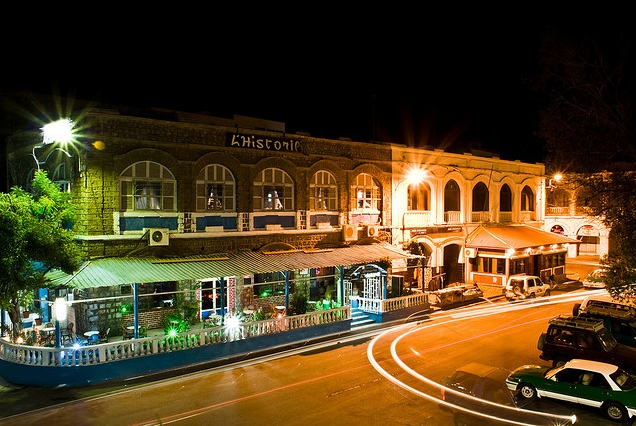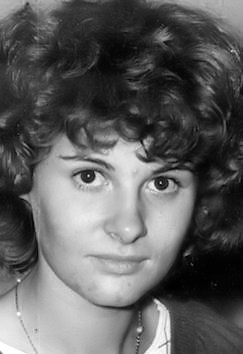
The restaurant l'Historil in Djibouti, as the group of students and scientists must have seen it during their visit the night before the attack.


Annette Bartheltborn in Bonn on October 3, 1963, she was the youngest of the students killed. After achieving the Bachelor of Science degree at the University of Bonn, she continued her studies in Kiel in 1985 with a major in fisheries biology and minors in zoology and oceanography. Annette Barthelt attracted the attention of her academic teachers with her strong human charisma, joie de vivre and great attentiveness in her field of study. During a first major research voyage, she gained pleasure in issues of seagoing marine research and therefore applied to participate in the Meteor expedition to the Arabian Sea. On this voyage, which lasted several months, Annette Barthelt intended to collect samples for her upcoming diploma thesis on the distribution of zooplankton as a food source for fish larvae. Annette Barthelt was at the beginning of her scientific career, and it was already clear that she could have found success and satisfaction in the process. |

Marco Buchallaborn in Frankfurt on November 27, 1959, Marco spent part of his youth in the Middle East. He was one of the few German students who could communicate in the Arabic language. One of his goals was to later use this professionally as a fisheries biologist. After his intermediate diploma in Munich, the German Academic Exchange Service offered him a year of study in Cape Town, which Marco Buchalla used with great intensity. After receiving his Bachelor of Science degree, Marco Buchalla moved to the University of Kiel in 1983 and completed his semester thesis during a summer course at the "Bermuda Biological Station" in 1985. The stimulating cooperation with him was a benefit for all his colleagues. In 1986 Marco Buchalla passed his oral diploma exam with fisheries biology as major subject and zoology and computer science as minor subjects, without exception with very good results. During the Meteor expedition, Marco Buchalla planned to use a new, technically complicated oceanographic measuring instrument to record the size distribution of plankton organisms on a small scale in situ. |

Hans-Wilhelm Halbeisenborn in Bamberg on December 19, 1953, Harvey also studied fisheries biology in Kiel as a major and minors in zoology and physics. Before he began to work as a scientist, he took the opportunity several times to participate in expeditions of the fishery research vessel Anton Dohrn to the Irish Sea. In 1982, as part of his diploma thesis, he created the first identification key for fish larvae of the Irish Sea with his great drawing talent. This made him one of the few experts in Germany on the taxonomy of these organisms. He has passed on his knowledge to others many times through active help in practical courses. During his PhD thesis he investigated the reason of different distribution patterns of plankton in the Irish Sea using a newly developed biological measurement system. Hans-Wilhelm Halbeisen succeeded in further modifying the instrument, and he intended to use a new prototype of the system on the Meteor expedition. Hans-Wilhelm Halbeisen was an optimistic person, cheerful to the core, with firm ideas about what he considered important for himself and to others. |

Daniel Reinschmidtborn on November 5, 1959 near Frankfurt/Main, Germany, Daniel went to the University of Brest in 1983 after completing his Bachelor of Science degree in Biology, in order to devote himself for the first time to the study of marine sciences. He spent the last years of his studies at the University of Kiel. He quickly attracted the attention of the lecturers of fisheries biology due to his great technical talent and willingness to apply new methods, which he familiarized himself with independently, when working on scientific problems. Daniel Reinschmidt also participated in biological marine research trips several times during his graduate studies. He was invited by English colleagues on a research trip to the Celtic Sea because of his early acquired knowledge. Together with his girlfriend Annette Barthelt he intended to use the meteor expedition for his diploma thesis. After graduation, the two young students wanted to set up an aquaculture business in France with friends and colleagues and use their scientific skills to solve the problems in that aquaculture business. |
It should not be forgotten at this point that in addition to the fatalities among the group of German students and scientists, there were also several seriously injured. Four young marine scientists from Kiel survived severely injured with burns, amputations, bone shattering, damaged eardrums and internal injuries. Some of them are still suffering from the consequences today. At least, a joint initiative of the then Federal Ministry of Research and Technology, the state of Schleswig-Holstein and the Institute of Oceanography at Kiel University was able to provide the four marine scientists with a secure job in marine research.
We studied together, we were fellow students, the interest in the sea, in fish connected us ... and we were friends. I was particularly a friend of Daniel and Anette and it was a very good plan for us to work together for two months on the Meteor and spend our free time together. We, that was not only Annette and Daniel and me but also several other colleagues and fellow students, who were all booked for the voyage section 3a and 3b from Djibouti. After the end of the research cruise we planned to spend another week of diving vacations together in the Maldives.
But then everything came differently. I had planned. together with my colleague Catriona Clemmesen, a herring larvae rearing for the early spring of 1987, these were important experiments for our doctoral thesis. The rearing was supposed to be completed by mid-March in order to be able to travel to Djibouti in time. However, the spring had been unusually cold and dull and the herring spawning stocks were late in arriving in the Kiel Fjord and the Kiel Canal in this spring of 1987. This circumstance then caused the planned rearing to overlap with the schedule to participate in the Meteor trip starting from Djibouti. After some discussions with our PhD supervisor, Prof. Dr. Walter Nellen, on how to resolve this conflict, we finally decided together that we would not join the expedition until cruise leg 3b which was supposed to take-off from Oman.
At first we were a bit sad that we could not start the expedition together with Annette and Daniel, but we were sure that we woulkd be able to spend the planned diving vacation together. A few evenings before the departure of the participants booked for Djibouti, we met in a famous student pub, the Oblomow in Kiel, in a larger group to celebrate farewell. When we left the restaurant in the late evening we were already full of anticipation for a reunion under subtropical skies. I still remember the words when we all took each other in our arms, saying sgoodbye: ...I hope we see each other again in good health.... normally rather a phrase when saying goodbye to someone, which in this case a little later against the backdrop of the terrible events in Djibouti should get a very special meaning. This evening was the last time I talked and laughed with Annette and Daniel.
On March 19, early in the morning, my colleague Catriona called me and reported that Daniel, Annette and Marc had presumably died in a bomb attack in Djibouti the night before and that there were many injured among the other participants. The exact circumstances were not yet known, but I remember being paralyzed with horror, unable to think clearly, and thinking that this was the end of the expedition. The next days were terrible, it was still unbelievable that a bomb attack somewhere in Africa had hit our own circle of friends. The responsible trip leaders, the directors board of the Meteor and the DFG had to decide whether the expedition should be continued. But I also had to make a decision for myself personally. Finally it was decided to continue the expedition. This decision was probably also based on the conviction that one must not give in to terror and that the victims would not be served by giving up. I finally decided to fly to Oman as planned and join the expedition there to collect data for my PhD.
After arriving in Oman and moving into my cabin the next day on the Meteor with a colleague, we found some personal items left behind in the desk drawers...they were Daniel's and Annette's items as it turned out later. It was a very depressing feeling to live for a longer period of time in the cabin that Annette and Daniel had moved into a few weeks ago full of anticipation, and the joy that one normally feels at the beginning of such an exciting marine science expedition did not occur. This corresponded to the mood of actually all new scientists in the first weeks. In many conversations we tried to deal with what had happened.
Until today, these memories are always brought back on the occasion of the annual scientific award ceremony of the Annette Barthelt Foundation. Today, when the number of dead in bomb attacks is reported, I always spontaneously think of how much suffering the seriously injured have to endure, which is usually not reported. Another thought moves me again and again. If I had traveled to Djibouti with Annette and Daniel, we would have sat together at the table in the evening in the restaurant L'Historil ..... the cold spring of 1987 and the herring larvae rearing probably saved my life...I still have, after more than 35 years, the original list of participants on which I was booked together with Daniel and Annette for the trip from Djibouti, as a reminder how narrow the line in life often is, which decides about luck or misfortune, how fateful life can be.